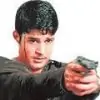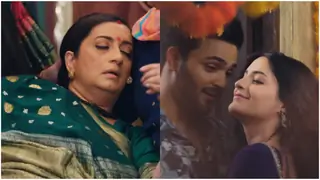 Naushad - Mughal-E-Music Filmfare Article
Naushad - Mughal-E-Music Filmfare Article (July 1997)
As told to Sabir Masani
Eighty eight years ago, on December 25, I was born in Lucknow. Music was ingrained in me from childhood. As a kid, I would visit the annual fair at the Deva Sharif in Barabanki... all the great qawwals and musicians of those days would perform before the devotees.
There, I met a flute player from Bareilly. His tunes still reverberate in my memory. From morning till night, I would sit by his feet, listening to his wondrous melodies.
My interest in music evolved under the guidance of Ustad Baban Khan and Ustad Yusuf Khan. But my father was extremely orthodox. He felt that our Muslim community wouldn't appreciate the fact that his son had taken up music to earn a livelihood. I remember it was the day of Divali when my abba berated me and said that either I choose music or the house. Without hesitating for a minute, I said, "Aapko aap ka ghar mubarak, hume apna sangeet." I turned my back on my father and left for Bombay.
Silent Era
I used to watch silent films at the Royal theatre in Lucknow. Theatre owners would hire a team of musicians to play the tabla, harmonium, sitar and violin. The musicians would watch the film first, make notes, finalise the scales required. When the show began in the evening, they would sit in front of the screen and play music for the scenes. This was a great way to be entertained and learn music at the same time. It made me grasp the nuances required in composing a film's background music score.
The Bombay Experience
I reached Bombay in 1937. Initially, I stayed with an acquaintance from Lucknow at Colaba. After a while, I shifted to Dadar opposite the Broadway theatre. I would sleep on the footpath.
This suited me fine. Otherwise I would have had to walk in the hot sun to Dadar in search of work at the studios. My perseverance paid. I started assisting music director Ustad Jhande Khan who was at the peak of his success those days. I was paid a monthly salary of Rs 40. The producer was a Russian... he had set up a studio at Chembur, which was an extremely desolate place in those days. It wasn't accessible by bus or train. As it happened, all our hard work was in vain. The film didn't see the light of the day.
Again I was unemployed. Every day seemed longer than a year. Finally, I landed in Ranjit Studio, where I assisted Khemchand for the film Kanchan. But it was painful working at Ranjit. The musicians were haughty and indisciplined... they wouldn't take instructions from an assistant director.
So I left Ranjit, in disgust, swearing to myself that I would never return. After that I assisted various music directors on the films made by eminent directors like A.R. Kardar and P.N. Madhok. In 1941, I became a full-fledged music director with Prem Nagar. The story was set in Kutch. I did a lot of research into the folk music of the area.
Technical Glitches
Recordings were done in quiet parks and gardens after midnight. Because the studios did not have sound-proof recording rooms. In the gardens, there would be no echo and disturbances, unlike the studios where the sound reverberated because of the tin roofs.
Incidentally, the echo effect used by me in Ratan was achieved through a very crude but effective technique. I'd kept a microphone in a toilet which had ceramic tiles all over. Then I played the music... so the sound reverberated against those tiles, producing an echo effect.
Overlapping Technique
I used this special technique in films like Uran Khatola and Amar. We would record the voice of a particular artiste on a scale of 90... then we would record his voice on 70... then 50... and so on. After the complete recording, we would play it for the scene and the impact it created was terrific.
In the early '40s, only a single mike was used for the singers as well as musicians. The microphone called 'Fedler Tone' had to be heated on the fire before it could start. A violinist would first come to the mike, play his piece, move out, then the singer would sing his lines, then the tabla player would play his piece...
All this was very tedious, but it gave us immense pleasure because we were always trying to be technically innovative.
Baiju Bawra
In 1953, Baiju Bawra was released at the Broadway theatre in Dadar. It was a big hit.
And to think the proprietors of Prakash Pictures were thinking of closing shop. They had come to my house... they asked me to come with them to touch the keys of the studio with my hands since I was also a member of their company. They said that the studio has to be locked up since it had suffered a financial loss. I felt very sad. I asked them if they could make just one more effort to survive.
They had nothing to lose. They agreed, and I gave them the subject of Baiju Bawra. They wanted to sign Dilip Kumar and Nargis. But I was adamant. I said the film's highlights would be its story, music and lyrics. It shouldn't be overshadowed by stars. Fresh faces would be more appropriate. So Bharat Bhushan was finalised to play the part of Baiju Bawra. For the heroine, I contacted Ali Baksh (father of Meena Kumari) who was thrilled. It was Meena Kumari's first big break.
On the day of the premiere at Broadway, the producers asked me how I felt now that the public had loved the picture. Tears rolled down my cheeks. I looked on the other side of the footpath where I used to sleep. I said, "Us footpath se yahan aane tak 16 saal lag gaye."
Aan
I created a symphony for Aan on stage with a hundred musicians. I had a special tent... made of blankets... on the surface, I laid out coir carpets, so that the sound wouldn't echo.
The final recording was done in London. We worked day in and day out for three months. We were under enormous pressure when we received news that the Liberty cinema in Bombay would open with this film. People slept for days outside the theatre to book tickets in advance.
My symphony was widely appreciated in Britain, it was played on BBC. Orson Welles who was busy with his Othello also happened to see the rushes of Aan and loved the music.
Mughal-E-Azam
I had used a hundred chorus singers for the first time for the song Mohabbat zindabad, this music composition was one of my best. But sadly, my music for Mughal-e-Azam wasn't considered worthy of an award by the Filmfare editor. He told me that it was too refined and classical. So he gave his casting vote for Taxi Driver, because it had music which, he said, was more filmi.
Relationship With Dilip Kumar
I recommended Dilip Kumar for films like Andaz and Mela. I composed the music for several of his films. Later, some producers preferred to take on other musicians. I specifically told Dilip Kumar, "Never recommend my name! Let the music director be signed at the producer's discretion."
Today's Music
I feel lost. Film-makers don't work hard on their lyrics or music... for them music is business. They want quickie stuff with sex appeal. I sometimes wonder whether they know what sex is. For them, it's just a piece of flesh. Moreover, today's musicians do not know the s of sargam and yet they're on top of the charts.
The deterioration started in the early '80s. The Western music has been aped to such an extent that there is decadence all around us.
Lyrics like, Main to raste se jaa raha tha, bhel puri kha raha tha are hits, but that doesn't mean they are more valuable than Ghalib's poetry.
Perhaps all this is a passing phase. Maybe melody will return some day.
Importance of Radio
Radio was a strong force during my time and influenced the masses considerably. But I always felt that programmes like Binaca Geetmala had their prejudices and biases. Now the same thing is going on in the countdown programmes on television. It is very wrong to judge the merit of a song by its position on the charts.
Victimisation of Muslims
Because of Partition, several film-makers and artistes migrated to Pakistan. Some of those who had established themselves remained here... and weren't victimised as such.
But newcomers were victimised and deprived. Meetings held by some prominent artists, film-makers and journalists who were anti-Muslims. This was unfortunate. In a profession which thrives on creativity, the only religion is art.
Singers of that Era
I worked with K.L. Saigal on his last film Shah Jahan. It was very painful to see such a remarkable talent fall prey to alcohol. He would drink peg after peg on the sets, almost as many pegs as the retakes he gave. If he gave ten takes, he would end up drinking ten pegs... even though he was suffering from cirrhosis of the liver.
Once the industrialist, Panipat Singhania, visited the studio where Saigal was recording and offered him a sum of Rs 25,000 to sing at a get-together. Saigal agreed because the money was tempting.
Soon after, a coolie came up to him and said that he and his family were great fans of his. If he could grace their daughter's wedding... it was on the same day as Mr Singhania's party... they would be delighted. After a moment's thought, Saigal gave them the nod and went to their house in Bachubhai Ki Wadi. He didn't go to Singhania's get-together. You don't make singers like him anymore.












 In Naushad's career spanning 60 years, film "Saathi" came roughly halfway, but it was a landmark that the legendary musician did not relish recalling.
In Naushad's career spanning 60 years, film "Saathi" came roughly halfway, but it was a landmark that the legendary musician did not relish recalling.
















